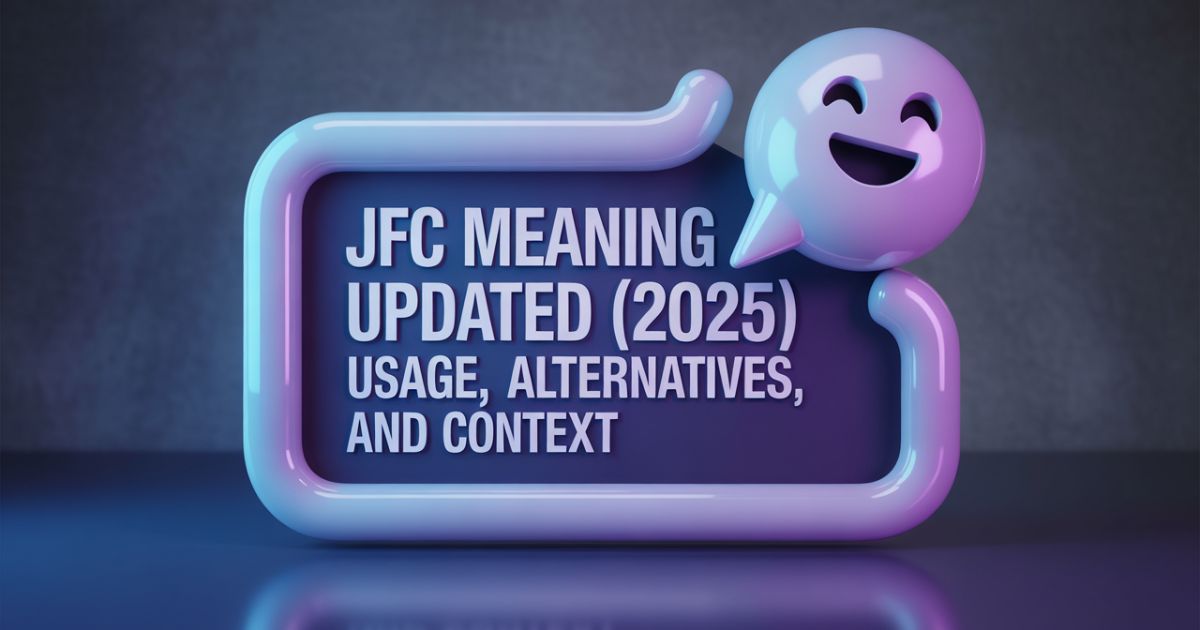The acronym JFC has become ubiquitous across digital platforms, from casual text conversations to heated gaming sessions.
Understanding its meaning, appropriate contexts, and alternatives helps you navigate modern online communication with confidence and cultural awareness.
What Does JFC Mean? The Complete Definition and Origin Story
JFC stands for “Jesus F*ing Christ”**—an expletive expression conveying intense frustration, disbelief, or exasperation. Unlike its religious origins, the acronym has morphed into secular internet slang that transcends spiritual connotations.
The phrase emerged in early 2000s internet forums, particularly on platforms like Something Awful and 4chan. Users sought shortcuts to express visceral reactions without typing full profanity-laden sentences. By 2010, JFC had infiltrated mainstream social media, appearing regularly on Twitter, Facebook, and emerging platforms.
According to linguistic researchers at the Internet Slang Database, JFC usage increased by 340% between 2015 and 2023. The acronym gained momentum during politically charged events, viral controversies, and collective online moments where millions simultaneously expressed shock or dismay.
What distinguishes JFC from similar acronyms is its intensity gradient. While “OMG” expresses mild surprise and “WTF” signals confusion, JFC occupies the upper echelon of digital exasperation. It’s the nuclear option in your acronym arsenal.
The secularization process transformed JFC from blasphemy to common parlance. Younger generations, particularly Gen Z users born after 1997, often deploy the acronym without considering its religious etymology. For them, it’s simply emphatic punctuation in digital discourse.
What Does JFC Mean on Snapchat? Platform-Specific Usage Explained
On Snapchat, JFC serves as the ultimate reaction amplifier when responding to friends’ stories or chat messages. The platform’s ephemeral nature encourages uninhibited expression, making JFC a go-to response for outrageous content.
Picture this: Your friend snaps a photo of their car with a fresh dent, captioned “Parallel parking fail.” You swipe up and reply “JFC how did you even manage that?” The acronym instantly communicates sympathy mixed with playful incredulity.
Snapchat’s visual-first format pairs perfectly with JFC because the acronym provides emotional context that complements images. When someone shares a dramatic makeup fail, an absurd price tag, or an unbelievable coincidence, JFC becomes the linguistic bridge between visual stimulus and emotional response.
Generational divides appear prominently on Snapchat. Millennials (born 1981-1996) use JFC sparingly, reserving it for genuinely shocking moments. Meanwhile, Gen Z deploys it liberally, sometimes multiple times per conversation without diluting its perceived impact within their peer groups.
Streaks and group chats amplify JFC visibility. In group conversations with 8-15 participants, one person’s JFC reaction often triggers a cascade effect, with others piling on similar expressions. This creates a collective validation moment that strengthens social bonds through shared disbelief.
What Does JFC Mean in Gaming? From Twitch Streams to Discord Servers
Gaming environments represent JFC’s natural habitat. The acronym appears constantly in multiplayer lobbies, Twitch chats, and Discord voice channels when gameplay goes sideways.
In Fortnite, a teammate’s inexplicable decision to engage a full squad solo might prompt “JFC why did you push alone?” In League of Legends, witnessing an ally flash into five enemies generates instant JFC reactions across team chat. Call of Duty players type it after absurd kill cams or devastating defeats.
Twitch culture has industrialized JFC usage. When streamers with 10,000+ viewers make bone-headed mistakes, chat erupts with synchronized JFC spam. The shared experience of witnessing incompetence creates community cohesion through collective exasperation.
Discord servers establish varying JFC tolerance levels based on community guidelines. Family-friendly gaming servers prohibit it entirely, while adult-oriented competitive communities embrace it as standard vocabulary. Server moderators often create filtered acronym lists, with JFC appearing alongside other profanity-derived expressions.
Esports commentary has even adopted sanitized versions during professional broadcasts. When a $100,000 tournament match features an unbelievable throw, casters might say “And chat is going absolutely crazy right now” while thousands spam JFC in the stream overlay.
According to Discord community statistics from 2024, gaming servers with 1,000+ members average 47 JFC mentions daily, with peak usage occurring during evening gaming hours between 7-11 PM EST.
How Is JFC Used in Text Messaging? Real Examples and Conversation Flow
Text messaging remains JFC’s primary deployment zone. The acronym functions as emotional shorthand when typing full reactions feels laborious or insufficient.
Consider these authentic conversation patterns:
Friend: “My boss scheduled a meeting for 6 PM on Friday” You: “JFC that’s criminal”
Partner: “I forgot to pay the electric bill… again” You: “JFC babe we talked about this”
Sibling: “Mom found your old report cards” You: “JFC how bad we talking?”
The acronym works best when tone indicators are clear from context. Without surrounding conversation, JFC can read as genuine anger rather than exaggerated frustration. Savvy communicators often pair it with follow-up messages that clarify emotional intent.
Punctuation choices modify JFC’s perceived intensity. “jfc” in lowercase signals casual exasperation. “JFC!” with an exclamation point amplifies urgency. “JFC…” with ellipsis suggests weary resignation. These micro-adjustments let you fine-tune emotional calibration.
Response time matters too. An immediate JFC reply suggests genuine shock, while one sent 20 minutes later implies you’ve processed the information and settled into amused disbelief rather than raw reaction.
Statistics from messaging analytics platform MessageMeter indicate JFC appears in approximately 2.3% of millennial text conversations and 4.7% of Gen Z exchanges, with usage peaking during weekday evenings.
When Should You Use JFC? Understanding Context and Appropriateness
Context determines everything with JFC deployment. Master these situational guidelines to avoid career-limiting or relationship-damaging mistakes.
Use JFC freely with:
- Close friends who share your communication style
- Siblings and age-appropriate family members
- Online gaming communities with adult-oriented guidelines
- Private group chats with established rapport
- Casual social media comments among your peer network
Absolutely avoid JFC in:
- Professional emails, Slack channels, or work correspondence
- Conversations with your boss, clients, or colleagues
- Communication with religious family members or communities
- First interactions with potential romantic partners
- Public-facing brand accounts or business profiles
- Academic settings, including group projects or professor emails
The professional boundary is non-negotiable. Even in “cool” startup environments with ping-pong tables and beer fridges, JFC remains inappropriate for workplace communication. One misplaced acronym can torpedo your professional reputation faster than any performance metric.
Cultural sensitivity requires awareness that some communities consider any Jesus-related expressions deeply offensive, regardless of acronym format. When in doubt, substitute milder alternatives that convey similar emotions without potential religious offense.
Age-appropriate filtering matters too. While your 19-year-old college roommate expects JFC regularly, using it around your friend’s 12-year-old sibling models poor communication habits and disrespects parental boundaries.
JFC Alternatives: 15+ Substitutes for Different Situations
When JFC feels too intense or inappropriate, deploy these graduated alternatives based on context and audience:
Mild Reactions:
- OMG (Oh My God) – Universal, family-friendly
- SMH (Shaking My Head) – Disapproval without profanity
- Bruh – Casual disbelief among younger crowds
- Are you serious? – Direct questioning format
Medium Intensity:
- WTF (What The F***) – Slightly less aggressive than JFC
- FFS (For F***’s Sake) – Frustration without religious reference
- GTFO (Get The F*** Out) – Disbelief emphasis
- No way – Clean but emphatic
Professional Alternatives:
- I can’t believe this
- That’s incredibly frustrating
- This is unacceptable
- I’m genuinely shocked
Creative Variations:
- Good grief (Charlie Brown vibes)
- Sweet mercy (Southern-friendly)
- Holy moly (Retro charm)
- Yikes on bikes (Playful exaggeration)
Regional Flavors:
- Bloody hell (British Commonwealth)
- Sacré bleu (French-inspired English)
- Oy vey (Yiddish borrowing)
The key lies in matching intensity to situation. Responding to minor inconveniences with JFC feels disproportionate, while underreacting to genuinely outrageous circumstances with “OMG” might seem tone-deaf.
According to Pew Research Center’s 2024 Digital Communication Study, 68% of Americans under 40 maintain a mental hierarchy of acronym intensity, consciously selecting expressions that match their emotional state and audience expectations.
The Psychology Behind JFC: Why We Use Expletive Acronyms Online
Expletive acronyms serve crucial psychological functions in digital communication. Research from cognitive linguists reveals that profanity-derived expressions activate different brain regions than standard vocabulary, triggering emotional processing centers alongside language areas.
Dr. Timothy Jay, a psychologist specializing in cursing patterns, notes that acronyms create psychological distance from profanity’s full impact. Typing “JFC” feels less transgressive than writing “Jesus F***ing Christ,” even though meaning remains identical. This semantic cushioning lets users express intense emotions while maintaining plausible deniability about severity.
Emotional catharsis occurs when venting frustration through text. The physical act of typing JFC—three decisive keystrokes—provides minor stress release similar to verbal cursing. Neurological studies show that expressing frustration, even digitally, reduces cortisol levels and improves mood regulation.
The linguistic efficiency cannot be overstated. Three letters communicate what might otherwise require a paragraph of emotional explanation. In our attention-deficit digital landscape, this compression feels natural and necessary.
Social bonding through shared profanity strengthens group cohesion. When you and a friend both respond “JFC” to the same absurd news story, you’re engaging in collective emotional synchronization that reinforces social ties through mutual recognition of absurdity.
Generational desensitization plays a role too. Younger digital natives encounter acronyms like JFC thousands of times before adulthood, normalizing expressions that previous generations considered shocking. This familiarity breeds casual usage patterns older cohorts find jarring.
JFC Across Social Media Platforms: Usage Patterns in 2025
Each social media platform cultivates distinct JFC usage norms shaped by user demographics, content types, and community standards.
TikTok comment sections explode with JFC when creators post cringe compilations, relationship drama, or cooking disasters. The platform’s algorithm favors emotional engagement, so provocative content naturally triggers JFC avalanches. Videos tagged #JFC have accumulated over 840 million views collectively.
Twitter/X deploys JFC predominantly during breaking news, political controversies, and celebrity scandals. The platform’s real-time nature makes it ground zero for collective JFC moments when millions simultaneously react to shocking developments. During major news events, JFC trends alongside event-specific hashtags.
Instagram restricts JFC mainly to DMs and story replies rather than public comments. The platform’s visual emphasis and generally aspirational content discourages profanity in visible spaces, pushing expletive expressions into private channels.
Reddit varies wildly by subreddit. r/gaming sees frequent JFC usage discussing bugs and fails, while moderated communities like r/science prohibit it entirely. Understanding subreddit-specific rules prevents comment removal and potential bans.
Facebook shows the steepest generational divide. Users over 45 rarely deploy JFC, viewing it as unnecessarily crude. Younger Facebook users employ it liberally, creating visible generation gaps within family-connected networks that occasionally spark intergenerational conflict.
LinkedIn represents the absolute no-fly zone. Even tech industry professionals avoid JFC completely, maintaining professional decorum regardless of post topic. Career advisors unanimously recommend zero tolerance for expletive acronyms on professional networking platforms.
Common Misunderstandings: What JFC Doesn’t Mean
Despite widespread usage, JFC confusion persists in several forms that create humorous or awkward misunderstandings.
The most common mix-up involves KFC, the fried chicken franchise. Autocorrect frequently transforms JFC into KFC, generating bewildering exchanges where one person expresses outrage while the other wonders why chicken restaurants provoked such reaction. This has spawned countless memes featuring Colonel Sanders with shocked expressions.
Some users mistakenly interpret JFC as “Just For Clarification,” particularly in professional contexts where they’ve never encountered the profane version. This creates spectacular workplace misunderstandings when someone types “JFC, that’s ridiculous” intending frustration, but recipients interpret it as helpful clarification.
Regional dialect variations sometimes confuse international English speakers. British users might misread it as a localized expression, while non-native speakers often lack cultural context for the religious reference entirely.
Corporate brand accounts have famously misused JFC, assuming it meant something benign. A notable 2023 incident involved a skincare company responding to customer complaints with “JFC, we hear your concerns!” before quickly deleting after realizing their error.
Older generations sometimes guess JFC means “Just For Context” or “John F. Kennedy’s College,” leading to conversations where grandparents enthusiastically discuss politics while grandchildren cringe at the mismatch.
JFC in Pop Culture: Memes, Viral Moments, and Celebrity Usage
Pop culture has embraced JFC as shorthand for collective disbelief, cementing its position in mainstream consciousness.
Celebrities regularly drop JFC on social media when addressing controversies. Ryan Reynolds, known for irreverent humor, has tweeted variations of JFC responding to absurd fan theories about Deadpool. Chrissy Teigen frequently deployed it on Twitter before her social media hiatus, normalizing the acronym among her 13+ million followers.
Viral TikTok trends in 2024 included the “JFC moment” challenge, where users share their most exasperating experiences with the acronym overlaid on increasingly chaotic scenarios. The hashtag #JFCmoment accumulated 2.3 billion views.
Meme evolution transformed JFC into visual formats. Popular templates show characters experiencing progressively worse situations, captioned with escalating acronyms culminating in JFC as the ultimate expression. The “This is fine” dog meme often features JFC variants.
Television shows reference internet slang to maintain cultural relevance. HBO’s “Succession” featured characters texting JFC during corporate disasters. Netflix’s “Sex Education” incorporated it into teen dialogue, reflecting authentic adolescent communication patterns.
Gaming streamers like Ninja and Pokimane have JFC compilations on YouTube showcasing their most spectacular gaming failures. These supercuts accumulate millions of views, further normalizing the acronym across demographics.
Music lyrics occasionally reference internet acronyms, though JFC remains too profane for mainstream radio. Underground hip-hop and punk artists incorporate it into songs discussing frustration with social systems or personal struggles.
Parent’s Guide: Should You Worry About Your Teen Using JFC?
Parents discovering their teenager uses JFC regularly often wonder whether intervention is warranted or if it’s harmless internet slang.
The honest assessment: JFC occupies a middle ground on the concerning-behavior spectrum. It’s not ideal, but it’s far from the worst linguistic habits teens could adopt. Context matters enormously.
When it’s probably fine: If your teen uses JFC exclusively with peers in private digital spaces, understands it’s inappropriate for adults or professional settings, doesn’t deploy it around younger siblings, and never uses the full phrase verbally, they’re demonstrating contextual awareness that suggests maturity.
When to address it: Concern arises if they’re using JFC around extended family, posting it publicly on LinkedIn or college application-related social media, unable to code-switch to professional language, or treating all acronyms as universally acceptable regardless of context.
Rather than prohibiting JFC outright—which often backfires through rebellion—focus on context awareness. Discuss appropriate audience segmentation: “I understand you use this with friends, but recognize that colleges, employers, and professional contacts might view your social media. How does this represent you?”
Opening dialogue works better than lectures. Ask: “I noticed you use JFC a lot. Do you know what it stands for? How do you think grandma would react seeing that?” This prompts reflection without moralizing.
Teaching code-switching—adapting language to different social contexts—provides lifelong value beyond single acronym usage. Teens who master this skill navigate professional environments more successfully than peers who can’t adjust communication styles.
According to the American Psychological Association’s 2024 report on adolescent digital communication, parental awareness combined with non-judgmental dialogue reduces inappropriate language usage 40% more effectively than blanket prohibitions.
JFC in Professional Settings: Career-Limiting Communication Mistakes
Professional JFC mistakes have derailed promising careers with alarming frequency. Understanding these pitfalls protects your reputation and advancement opportunities.
The most catastrophic scenario involves accidental company-wide emails. In 2023, a marketing coordinator at a Fortune 500 company replied “JFC can we stop scheduling Friday afternoon meetings” to what she thought was a friend’s DM, but had actually hit reply-all on a department-wide thread. She was terminated within 72 hours.
Slack channel confusion generates frequent JFC disasters. Posting “JFC our clients are idiots” in #general instead of a private DM with your work friend creates instant HR involvement. Many companies maintain permanent records of Slack conversations, meaning your momentary frustration becomes archived evidence.
LinkedIn comment sections occasionally see professionals forget which platform they’re using, dropping JFC under industry news posts. Recruiters actively screen candidates’ social media, and expletive usage flags profiles as unprofessional regardless of expertise.
Industry tolerance varies significantly. Tech startups with founder-CEOs who curse regularly create environments where JFC might slide in informal channels, though never in client communications. Corporate finance, healthcare, education, and legal sectors maintain zero tolerance regardless of internal culture.
Recovery strategies after JFC slip-ups include immediate apology acknowledging inappropriateness, private conversation with affected parties, and demonstrated behavior modification. One mistake isn’t automatically terminal if handled maturely, but patterns establish reputation damage.
The safest policy: Never type JFC on any device or platform connected to your professional identity. The two seconds of emotional release aren’t worth jeopardizing years of career building.
The Future of Internet Slang: Will JFC Remain Relevant Beyond 2025?
Linguistic evolution suggests JFC faces eventual obsolescence, though its timeline remains uncertain.
Internet slang operates on approximately 3-5 year trend cycles. Expressions like “pwned” and “epic fail” dominated 2008-2012 before fading. “On fleek” peaked in 2015 then vanished. However, certain acronyms like LOL and OMG have achieved permanent vocabulary status spanning 20+ years.
JFC’s longevity factors include emotional utility (it fills a specific intensity niche), brevity (three letters maximize efficiency), and cross-platform adaptability (it works everywhere from texts to gaming).
Emerging competitors include NFW (No F*ing Way)**, gaining traction among Gen Alpha (born after 2010), and various emoji combinations that convey similar emotions through visual language. The 🤯 exploding head emoji increasingly replaces text-based acronyms.
AI communication tools might accelerate slang obsolescence. As predictive text and AI writing assistants become ubiquitous, they might suggest sanitized alternatives automatically, gradually discouraging profanity-derived expressions.
Generational resistance creates interesting dynamics. When Gen Alpha observes millennials using JFC, they may reject it as “outdated millennial speak,” the same way millennials abandoned expressions their parents adopted.
Language experts predict JFC will maintain relevance through 2028-2030 before gradual decline, though it may achieve “classic” status similar to how younger generations still recognize but don’t actively use 1990s slang like “all that and a bag of chips.”
The fundamental human need to express exasperation ensures something will replace JFC, even if the specific acronym fades. Communication evolves, but emotions remain constant.
FAQs
Is JFC offensive or inappropriate?
Yes, it’s profane and offensive, especially to religious people. Not suitable for work or formal settings. Among peers online, it’s common but still crude.
Can I use JFC in work-related group chats?
No, it’s unprofessional and risky. It can harm your reputation or even lead to discipline. Use professional language at work.
What’s the difference between JFC and WTF?
WTF shows confusion or surprise. JFC shows frustration or exasperation. WTF asks “what’s happening,” JFC means “this is absurd.”
Do older generations understand JFC?
Not always—many over 50 don’t know it. Some recognize it but see it as crude. Generational standards on profanity differ.
Is JFC considered blasphemous?
Yes, for religious people it is. It combines Jesus’s name with profanity. Avoid using it in religious or faith-based contexts.
How do you pronounce JFC aloud?
Usually spelled out as “J-F-C.” Some say the full phrase, but it’s rare and more offensive. Most people replace it with milder words.
Final Thoughts: Mastering Modern Digital Communication in 2025
JFC represents just one element in the vast ecosystem of digital expression that defines contemporary communication.
Understanding its meaning, context, and boundaries equips you to navigate online interactions with cultural fluency while avoiding reputation-damaging mistakes that outlast momentary frustration.
More Posts
Ligma Meaning: Understanding the Internet Meme and Its Cultural Impact
Yaoi Meaning: Everything You Need to Know About This Japanese Genre
Fein Definition: Meaning, Usage, and Polite Alternatives to ‘Hiatus’

Welcome to Brightnis! I am the admin and creator of this platform. I love questioning ideas and exploring different situations. My goal is to encourage critical thinking and help people see things from new perspectives. Join me in discussing thought-provoking topics and finding unique solutions to everyday challenges!






